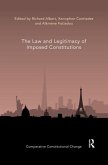The state is no longer the sole player in public action: it is now obliged to interact with civil society, the private sector and populations. This transition from "government" (a state monopoly) to "public governance" (public action with a plurality of actors) implies a certain repositioning. It is in the new relationship between the state and societies that the exercise of political power is called upon to find coherence and to restructure the legitimacy of the state. This diagnosis was the starting point for the reflections contained in this work. From the standpoint of legitimacy, the authors of this book have studied a series of experiences and practices, both in various countries around the world and within different international organisations. They offer a series of descriptive contributions designed to facilitate comprehension and analysis of the processes seeking to legitimise political power, according to a variety of contexts and the diversity of conceptions of power.
Bitte wählen Sie Ihr Anliegen aus.
Rechnungen
Retourenschein anfordern
Bestellstatus
Storno









